Wikipedia:Picture of the day/August 2013
|
Featured picture tools: |
These featured pictures, as scheduled below, appeared as the picture of the day (POTD) on the English Wikipedia's Main Page in August 2013. Individual sections for each day on this page can be linked to with the day number as the anchor name (e.g. [[Wikipedia:Picture of the day/August 2013#1]] for August 1).
You can add an automatically updating POTD template to your user page using {{Pic of the day}} (version with blurb) or {{POTD}} (version without blurb). For instructions on how to make custom POTD layouts, see Wikipedia:Picture of the day.
August 1

|
Charles III (1716–1788) was king of Spain from 1759 to 1788. As king, he implemented far-reaching reforms, such as weakening the Catholic Church and its monasteries, promoting science and university research, facilitating trade and commerce, modernizing agriculture and avoiding wars. However, he never achieved satisfactory control over finances, and his reforms proved short-lived. Painting: Anton Raphael Mengs
Recently featured:
|
August 2

|
The western departures concourse of London King's Cross railway station as seen through a fisheye lens. This semi-circular concourse, designed by John McAslan, built by Vinci, and completed in March 2012, is designed to cater to much-increased passenger flows, and provide greater integration between the intercity, suburban and Underground sections of the station. Photo: Colin
Recently featured:
|
August 3

|
The Atlas moth (Attacus atlas) is a large saturniid moth found in the tropical and subtropical forests of Southeast Asia, and common across the Malay Archipelago. Considered the largest moth in the world in terms of wing area, the species shows considerable sexual dimorphism, with females such as the specimen pictured here generally much heavier than males. Photo: Quartl
Recently featured:
|
August 4

|
The Rainbow Bee-eater (Merops ornatus) is the only species of bee-eater found in Australia. The brilliantly coloured species averages 19–24 centimetres (7.5–9.4 in) in length. Photo: JJ Harrison
Recently featured:
|
August 5

|
Jesse Owens (1913–1980) at the start of the 200 meters sprint in the 1936 Summer Olympics held in Berlin, Germany. During the games, Owens won four gold medals, in the 100 m and 200 m sprint, the long jump, and the 4 × 100 m relay. Photo: Unknown
Recently featured:
|
August 6
|
Mikumi National Park is a national park near Morogoro, Tanzania. The fourth largest park in the country, its landscape is often compared to that of the Serengeti. Various species of animal are found here, including lions, zebras, and giraffes. Photo: Muhammad Mahdi Karim
Recently featured:
|
August 7

|
Arlington Row, a row of Cotswold stone cottages in Bibury, Gloucestershire, England. Built in 1380 as a monastic wool store, the buildings were converted into weavers' cottages in the 17th century. William Morris declared the village to be the most beautiful in England. Photo: Saffron Blaze
Recently featured:
|
August 8
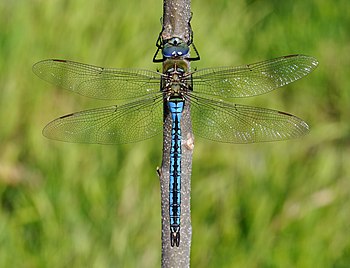
|
A male Emperor Dragonfly (Anax imperator), photographed in Puerto de la Cruz, Tenerife, Spain. Unlike the blue males, females of this species are green. Photo: Quartl
Recently featured:
|
August 9

|
Two paintings, The Nude Maja and The Clothed Maja, by the Spanish painter Francisco Goya. Depicting the same woman in the same pose, the 18th-century paintings are both held in the Prado, where they are hung side by side. The nude, the first clear depiction of pubic hair in a large Western painting, was adapted for a stamp in 1930: the first stamp to depict nudity. Painting: Francisco Goya
Recently featured:
|
August 10

|
|
Averbode Abbey, founded about 1134–35 by Count Arnold II of Loon, is a Premonstratensian monastery situated in the Archdiocese of Mechelen-Brussels in Belgium. The abbey reached its peak in the 16th and 17th centuries, though over the past hundred years it has been in a state of decline. Photograph: JH-man
Recently featured:
|
August 11
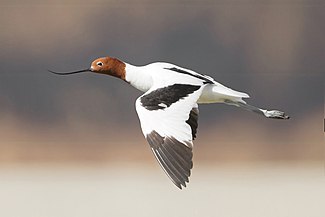
|
The Red-necked Avocet (Recurvirostra novaehollandiae) is a wader of the family Recurvirostridae which feeds by skimming the surface of water to catch small invertebrates. Endemic to Australia, the species is rare in Tasmania and an occasional vagrant to New Zealand. Photograph: JJ Harrison
Recently featured:
|
August 12
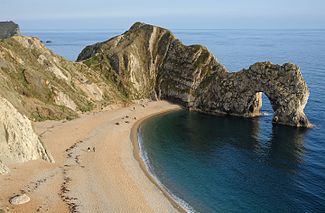
|
Durdle Door is a natural limestone arch on the Jurassic Coast near Lulworth in Dorset, England. Though privately owned, it is open to the public. Photograph: Saffron Blaze
Recently featured:
|
August 13

|
The Hall of Mirrors is the central gallery of the Palace of Versailles in Versailles, France. Construction of the room began in 1678, lasting until 1684. It has since been used for various state functions, including the signing of the Treaty of Versailles in 1919. Photograph: Myrabella
Recently featured:
|
August 14

|
Fyodor Dostoevsky (1821–81; depicted in 1872) was a Russian novelist, short story writer, essayist and philosopher. After publishing his first novel, Poor Folk, at age 25, Dostoyevsky wrote (among others) eleven novels, three novellas, and seventeen short novels, including Crime and Punishment (1866), The Idiot (1869), and The Brothers Karamazov (1880). Painting: Vasily Perov
Recently featured:
|
August 15

|
The Monarch butterfly (Danaus plexippus) is a milkweed butterfly and perhaps the best known of all North American butterflies (though it sometimes wanders to Oceania and Europe). Every year the population east of the Rocky Mountains goes on a southward migration and northward return, the only butterfly species to do so. Females, such as the one pictured here, will lay eggs during the trip; the migration spans the life of three to four generations. Photograph: Kenneth Dwain Harrelson
Recently featured:
|
August 16

|
The skull of the African buffalo (Syncerus caffer), a large African bovine. It has a long but stocky body and short but thickset legs, resulting in a relatively short standing height. The adult bull’s horns, as shown here, have fused bases, forming a continuous bone shield known as a "boss". Photograph: Jebulon
Recently featured:
|
August 17

|
The kris is an asymmetrical dagger from Southeast Asia famous for its distinctive wavy blade, although many have straight blades as well. A kris can be divided into three parts: bilah (blade), hulu (hilt), and warangka (sheath) Photograph: Chris Woodrich; edits: JJ Harrison
Recently featured:
|
August 18

|
A 1917 poster by Lucian Bernhard intended to sell war bonds in Germany. The caption, roughly translated, is "This is how your money helps you fight! Turned into submarines, it keeps enemy shells away! That's why you should subscribe to war bonds!" Mostly excluded from international financial markets during World War I, Germany was largely limited to domestic borrowing. The bond drives proved extremely successful, raising approximately 100 billion marks in funds. Poster: Lucian Bernhard; restoration: Bellhalla
Recently featured:
|
August 19
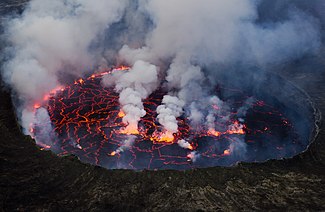
|
A lava lake at Mount Nyiragongo, a volcano found in Virunga National Park in the Democratic Republic of the Congo. Lava lakes, which can form in three different ways, are large volumes of molten lava, usually basaltic, contained in a volcanic vent, crater, or broad depression. Persistent lava lakes such as the one at Nyiragongo, which is the largest to appear in recent times, are rare. Photograph: Cai Tjeenk Willink
Recently featured:
|
August 20

|
The Mugimaki Flycatcher (Ficedula mugimaki) is a small bird from Asia in the Old World flycatcher family. Found in forests and woodlands, the birds migrate between their breeding grounds in Siberia and North-East China and their wintering grounds in South East Asia. Photograph: JJ Harrison
Recently featured:
|
August 21

|
St John the Apostle Church in Sheepscombe, Gloucestershire; established in 1820, it was expanded in 1872. Photograph: Saffron Blaze
Recently featured:
|
August 22
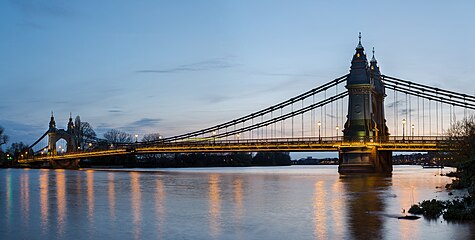
|
|
Hammersmith Bridge is a suspension bridge which crosses the River Thames in west London. The second permanent bridge on the site, the current bridge was designed by Sir Joseph Bazalgette and rests upon its predecessor's pier foundations. Bombings and an increase in traffic have led to the bridge being repaired and refurbished several times. Photograph: David Iliff
Recently featured:
|
August 23

|
Lysimachia monelli is a species of flowering plant in the family Myrsinaceae, native to the Mediterranean region. Though commonly blue (hence the common name blue pimpernel), orange examples as pictured here also exist. The orange-coloured flowers have a higher concentration of the pigment pelargonidin, while blue flowers have a higher concentration of malvidin. Photograph: Hans Hillewaert
Recently featured:
|
August 24

|
The Wood Duck (Aix sponsa) is a species of duck, with adults averaging 47 to 54 cm (19 to 21 in) in length with a wingspan of 66 to 73 cm (26 to 29 in). Owing to their attractive colouration, the ducks have often been brought to Britain from their native North America; this specimen was photographed at St. James's Park in London. Photograph: David Iliff
Recently featured:
|
August 25
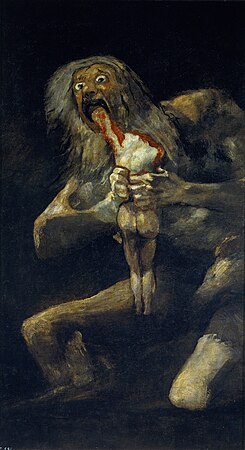
|
Saturn Devouring His Son is a painting, titled by art critics, created by Spanish artist Francisco Goya and painted onto the walls of his home along with 13 others. According to the traditional interpretation, it depicts the Greek myth of the Titan Cronus (in the title Romanised to Saturn), who, fearing that he would be overthrown by his children, ate each one upon their birth. Painting: Francisco Goya
Recently featured:
|
August 26

|
Elizabeth Farren (c. 1759 – 1829) was an English actress of the late 18th century. She made her premiere in a performance of She Stoops to Conquer in 1777, retiring over twenty years later. Horace Walpole described her as the "most perfect actress" he had ever seen. Painting: Thomas Lawrence
Recently featured:
|
August 27
|
The central business district of Perth, the capital and largest city of Western Australia, as viewed from Mill Point on the Swan River. Perth is the fourth most populous city in Australia, with an estimated population of 1.9 million living in the Perth metropolitan area. Photo: JJ Harrison
Recently featured:
|
August 28

|
The ladder snake (Rhinechis scalaris) is found mostly in peninsular Spain, Portugal, and southern France. It usually eats eggs, insects, and small mammals such as mice. The snake is now threatened by habitat loss. Photo: User:Benny Trapp
Recently featured:
|
August 29

|
The Blue Whistling Thrush (Myophonus caeruleus) is a bird found in South and South-East Asia. This largest of thrushes, measuring 31–35 cm (12–14 in) in length and weighing 136 to 231 g (4.8 to 8.1 oz), is divided into multiple subspecies. Pictured here is M. c. eugenei, the Thai subspecies, which is recognisable by its lack of white spots on the median coverts. Photo: JJ Harrison
Recently featured:
|
August 30

|
The United States Space Shuttle Discovery had its maiden flight on August 30, 1984. Its final mission was almost twenty-seven years later. Discovery spent a total of almost a year in space. Its missions helped to assemble the International Space Station, and it flew the Hubble Space Telescope into orbit. The shuttle was decommissioned on March 9, 2011. Today Discovery is on display at the Steven F. Udvar-Hazy Center of the Smithsonian National Air and Space Museum. Photo: NASA; edit: John O'Neill
Recently featured:
|
August 31

|
Saint Catherine's Monastery, an Eastern Orthodox monastery which lies in Saint Catherine, Egypt, on the Sinai Peninsula. Established between 548 and 565 AD, it is recognised by UNESCO as one of the oldest working Christian monasteries. Photo: Berthold Werner
Recently featured:
|
Picture of the day archives and future dates


